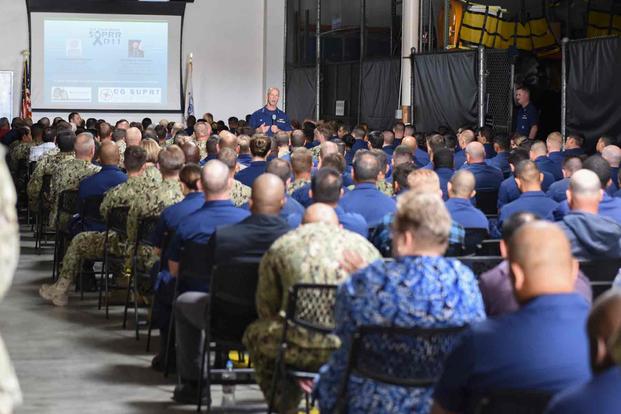The Coast Guard has announced a new policy requiring commanders to disregard "minor" misconduct -- including underage drinking or fraternizing -- by victims or witnesses in sexual assault cases to encourage reporting of such crimes.
The regulation is known as "Safe-to-Report" and the other military service branches under the Defense Department adopted it more than two years ago. The Coast Guard announced the policy Feb. 1 in a servicewide message.
The Coast Guard’s adoption follows a scandal in which the service investigated 102 cases of rape or sexual assault at the U.S. Coast Guard Academy from 1988 through 2006 but concealed the results of the review, dubbed "Operation Fouled Anchor." The investigation and cover-up were exposed last June in reporting by CNN.
Read Next: All 5 Marines Aboard Downed Helicopter in California Were Killed in Crash, Service Says
Now, victims and witnesses in the service -- including active-duty and reserve members, as well as Coast Guard Academy cadets and recruits -- who report a sexual assault will not be subject to discipline for what the policy calls "minor collateral misconduct."
Under the requirement, commanders are to consult with a staff judge advocate to decide whether the misconduct is "minor" or "non-minor," taking into account a number of considerations to determine if that person should be subject to discipline.
Commanders have "considerable discretion" to decide whether an offense is minor, utilizing guidance in the Uniform Code of Military Justice for some infractions that may have been punishable by up to a year in jail if the case went to court-martial, according to the service’s announcement in ALCOAST 050/24.
Such behaviors may include underage drinking; the victim being in a prohibited or unacceptable relationship at the time of the assault; or a violation of a lawful order or regulation such as a curfew, being at an off-limits location, or breaching school standards or barracks or berthing policies.
Commanders also are to take into consideration circumstances such as the victim's age and military experience; whether the suspect was in a position of authority or of higher rank than the victim; whether there was stalking or harassment involved; or whether the misconduct was related to the trauma, such as drinking underage to deal with an assault.
"If the alleged collateral misconduct is deemed minor, then the Safe-to-Report policy applies, and the victim must not be disciplined," the policy states.
If the misconduct is considered "non-minor," the commander retains discretion on whether and when to discipline unless a special trial counsel assumes authority over the alleged collateral misconduct.
Depending on the situation, a commander may take administrative actions to provide services to the victim or witness, such as referring them to substance abuse screening or medical treatment, including mental health care. Commanders also will have the discretion to suspend a victim or witness' access to their duties should they hold a high-level security clearance, while an investigation into the alleged crime is ongoing.
"It may be appropriate to temporarily decertify the victim from critical positions until
appropriate evaluations can be conducted," the policy states.
The policy also allows the Coast Guard Investigative Service to investigate and document alleged misconduct, but it "may impact the commander's actions or response to such misconduct."
The new requirement closely mirrors the Department of Defense's Safe-to-Report policy, which was instituted in November 2021 -- 11 months after it was required by the fiscal 2021 National Defense Authorization Act.
The Coast Guard, which is part of the Department of Homeland Security, was specifically excluded from the language of that legislation.
Coast Guard Commandant Adm. Linda Fagan ordered a top-down review of the service's policies, practices and culture in regard to sexual assault and harassment following CNN's bombshell investigation.
That review found that the service failed to live up to its core values when it mishandled reports of sexual assault and hid the results of the investigation into the cases.
But it stopped short of holding anyone responsible for the investigative failures and cover-up -- topics that were raised in a Senate hearing in December.
In a Feb. 6 press release, Coast Guard officials announced several other initiatives to address the service's handling of sexual assault, harassment "and other harmful behaviors.”
According to the release, Force Readiness Command will establish new training at various points in members' careers. Future leadership conferences will focus on culture within the service and the way ahead for addressing the issues.
"At times, we have failed to connect the workplace experience to our core values. We are committed to rebuilding trust and ensuring every member of our workforce (active-duty, reserve, civilian, auxiliary, and our families) feels empowered to own our culture," Master Chief Petty Officer of the Coast Guard Heath Jones said in a statement.
Among the steps taken in the past few months was the appointment of retired Coast Guard Capt. Laura Collins to serve as the service's first enterprise victim advocate, a position designed to support and represent victims.
Related: Coast Guard Apologizes for Mishandling of Sexual Assaults at Academy















